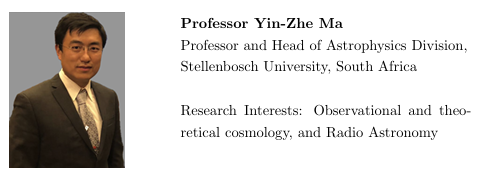4 pm – 5 pm A4-G04

Abstract: Cosmology, the understanding of the evolution of entire Universe, has progressed
very fast in the past several decades with the advances of modern telescopes. I will give a brief
overview of the modern cosmology of the last century and highlight its phenomenal successes
and distinctive challenges. I will explain how and why the measurements of cosmic microwave
background radiation, the relics of the primordial elements, and the galaxy distribution on large
scales can improve our understanding of the hot big bang. Then I will also discuss its distinctive
challenges, present the observational frontiers for this (next) decade of cosmology, highlighting
where the new physics may possibly emerge
Speaker’s Bio: Professor Yin-Zhe Ma obtained his Bachelor’s degree in Physics from Nanjing
University, a master’s degree from the Institute of Theoretical Physics at the Chinese Academy
of Sciences (supervisor: Prof. Rong-Gen Cai), and a Ph.D. degree in Astronomy from the Uni
versity of Cambridge (supervisor: Prof. George Efstathiou FRS). He conducted CITA National
Fellowship at the University of British Columbia Canada and a research associate at the Univer
sity of Manchester, and then moved to the University of KwaZulu-Natal South Africa as a senior
lecturer (2015) and then an associate professor (2018) and a full professor (2021). In 2023, he
moved to Stellenbosch University as a full professor and the founding head of astrophysics divi
sion in physics department. He chaired the NAOC-UKZN Computational Astrophysics Centre
and the Chinese-South African Forum of Astronomy. He is also an adjunct professor at Pur
ple Mountain Observatory and National Astronomical Observatory China during 2017-2021. In
2024, he is appointed as the Stellenbosch-Groningen Joint Research Chair of Astronomy.
His research focuses on observational and theoretical cosmology aimed at understanding the
fundamental laws of the Universe and uncovering the nature of dark energy and dark matter.
He is currently a core member of the Square Kilometer Array (SKA) Science Working group,
the Planck science team, Hydrogen Epoch Reionization Array (HERA), and the CMB Stage-4
experiment and LSST (Vera C. Rubin Observatory). With the Planck science team, he was
awarded the 2018 “Gruber Cosmology Prize” by the IAU. He has published over 130 papers,
with total citations exceeding 29000, h-index 47. He was awarded the NSFC Oversea Scholar
grant and several South Africa National Research Foundation grants. He was elected to the
Academy of Science of South Africa in 2022.
Organiser’s contact info: yenkheng.lim@xmu.edu.my (Yen-Kheng Lim)
